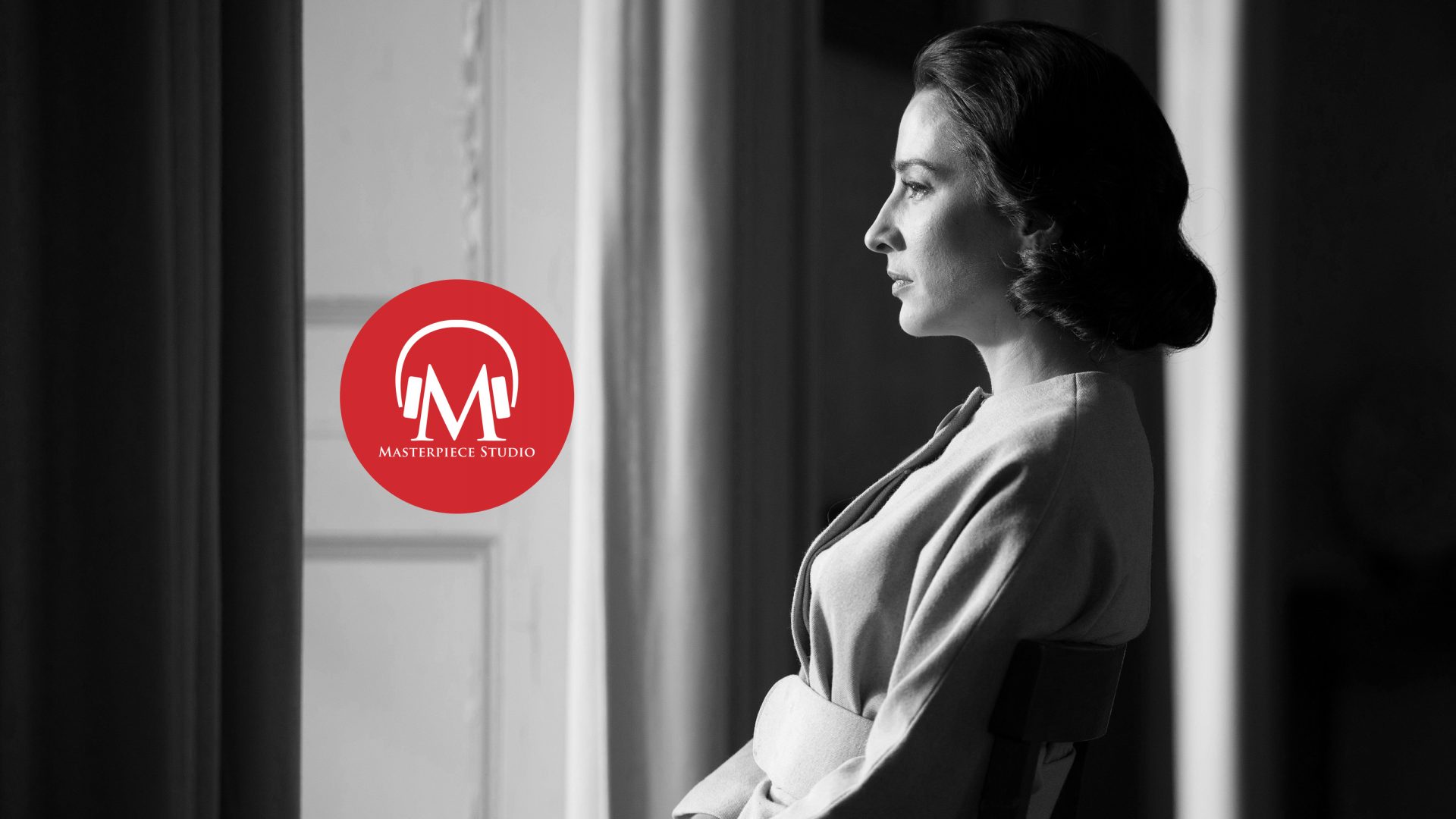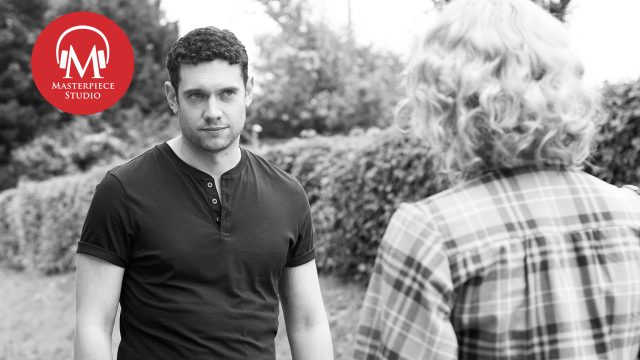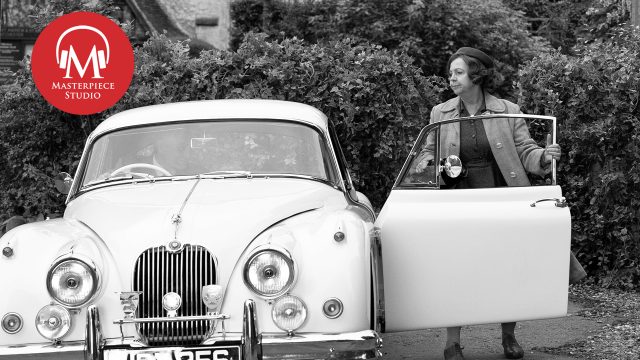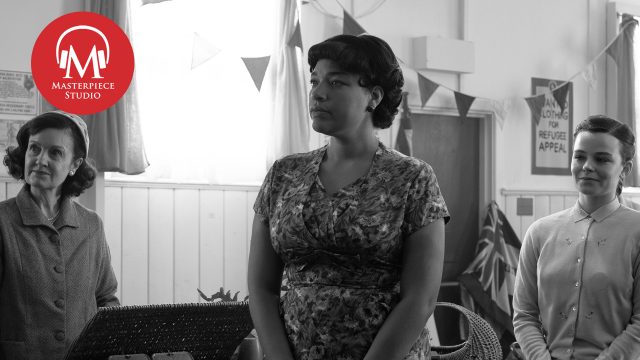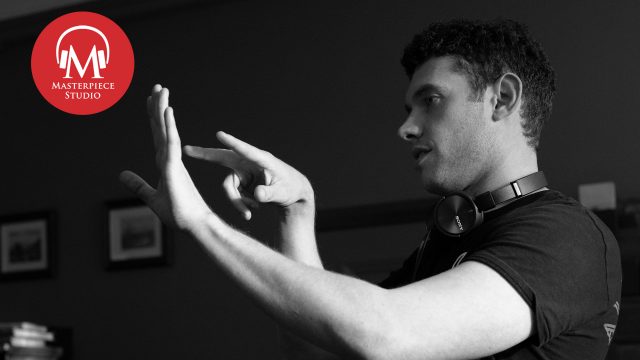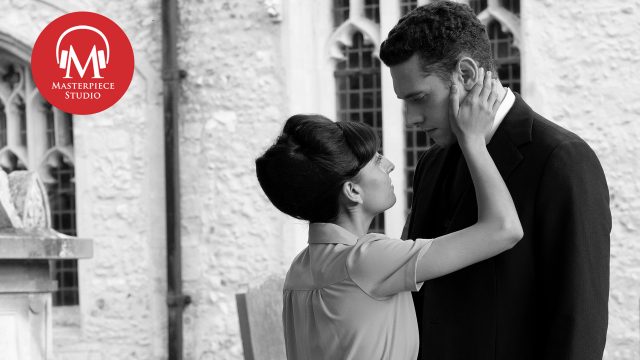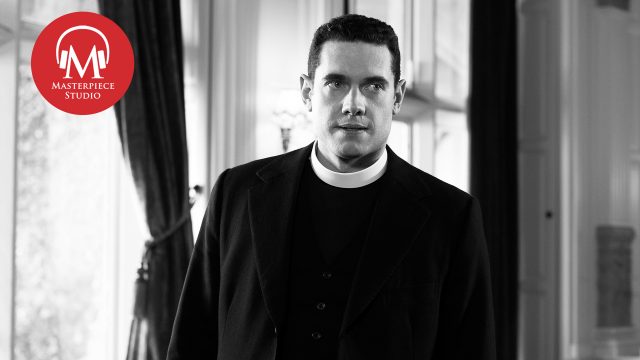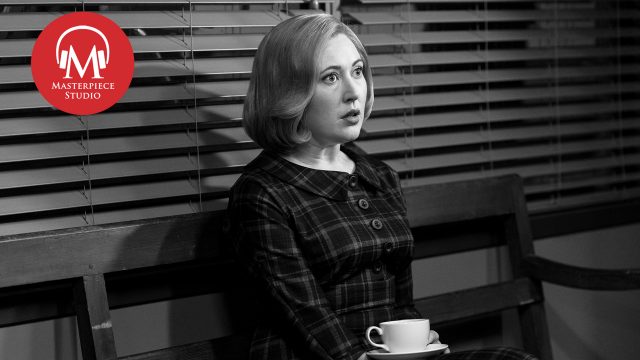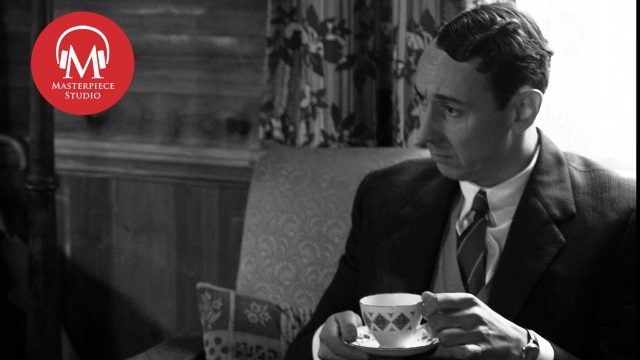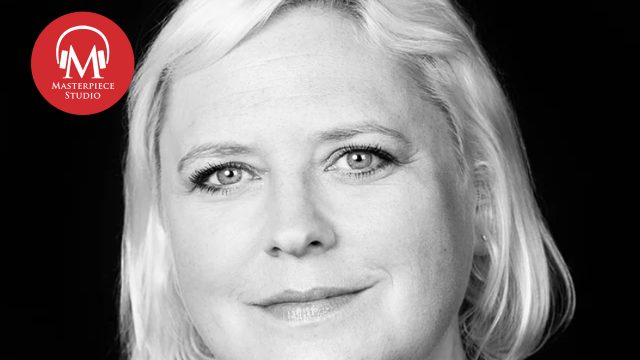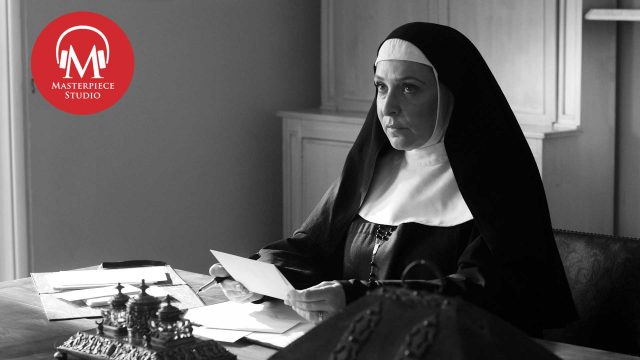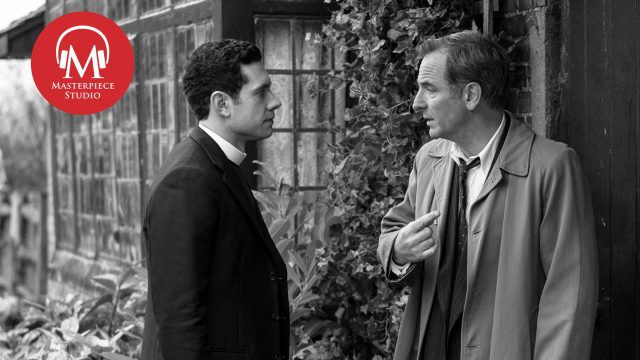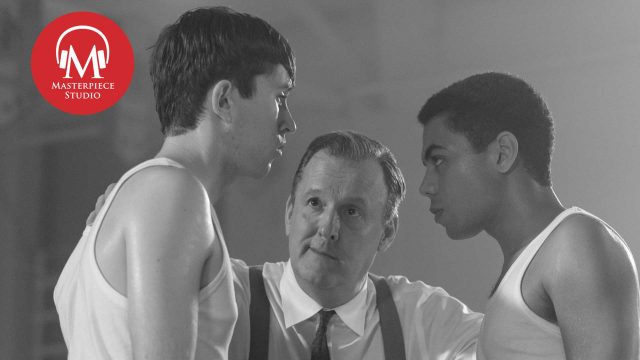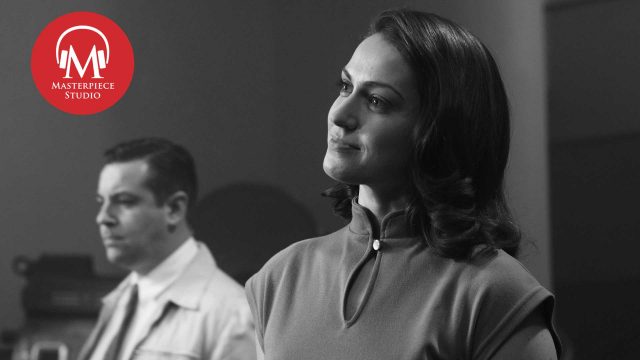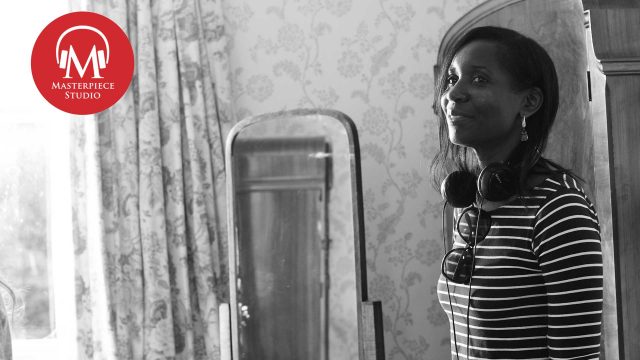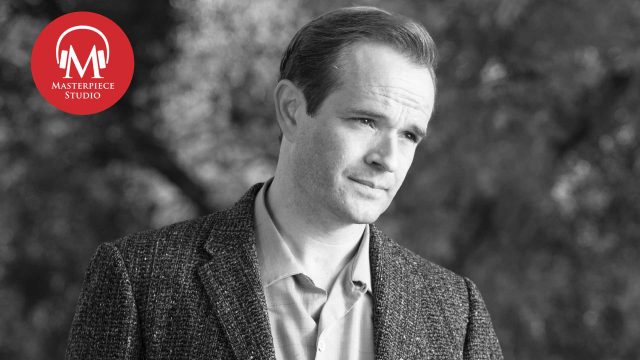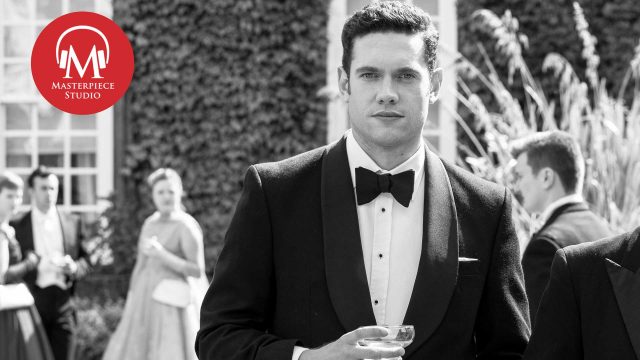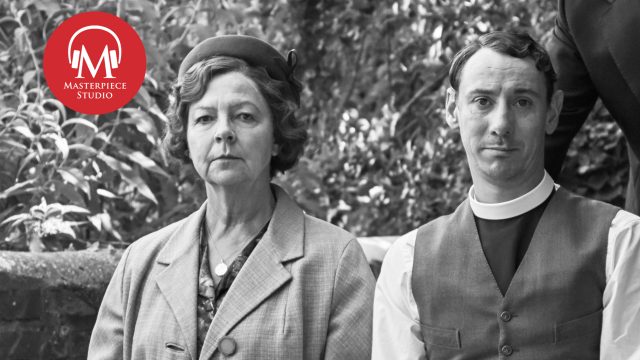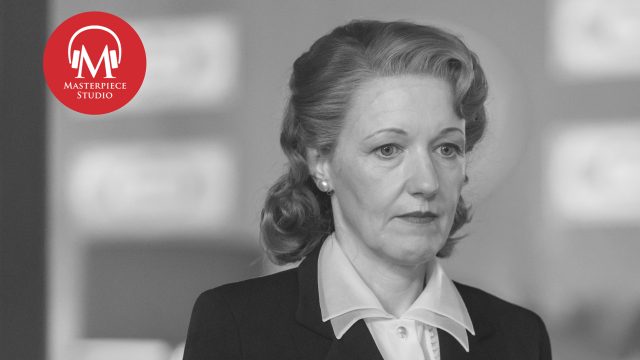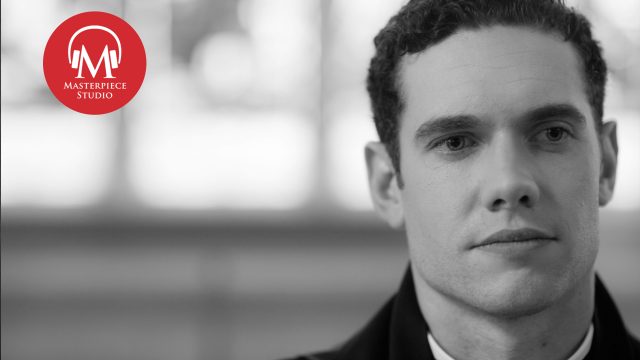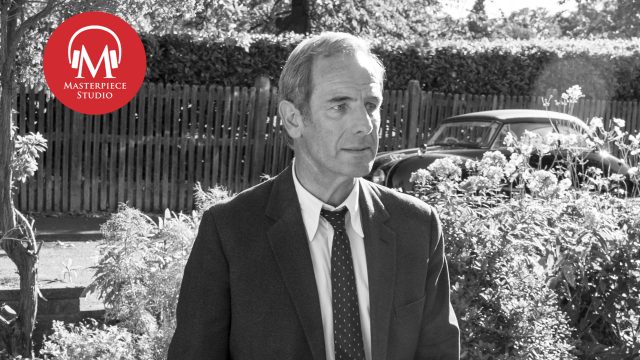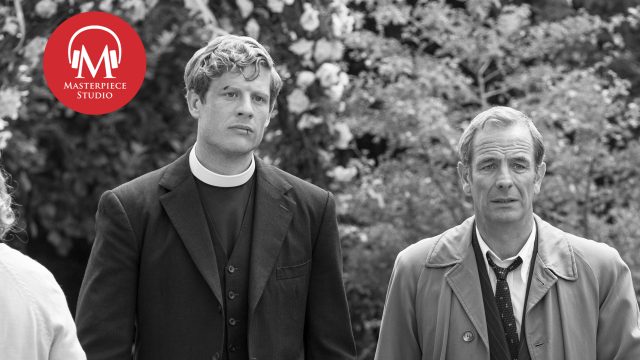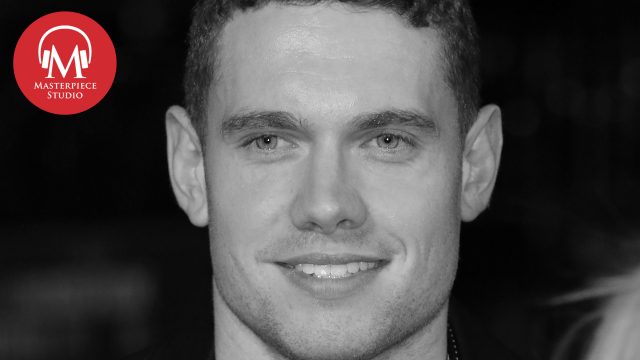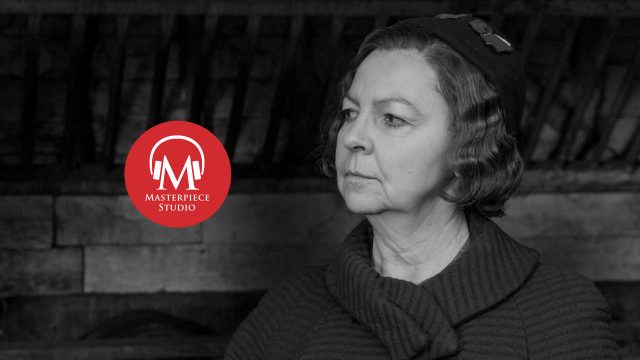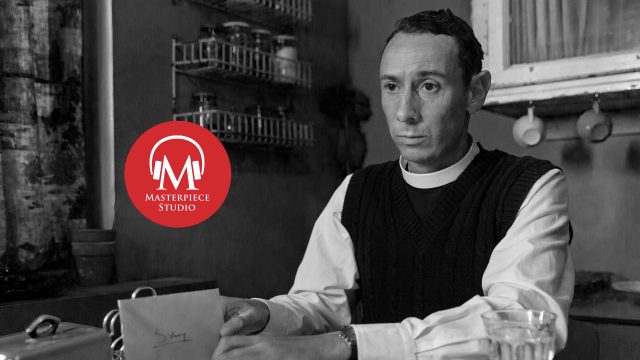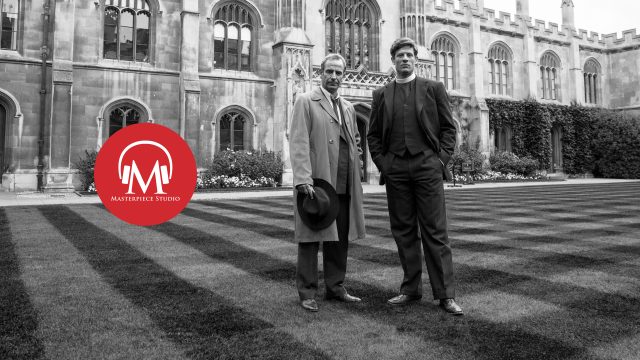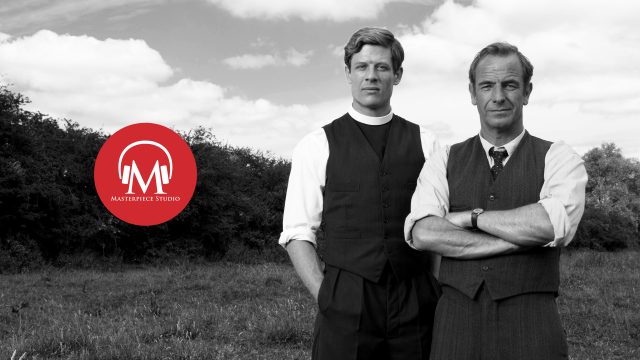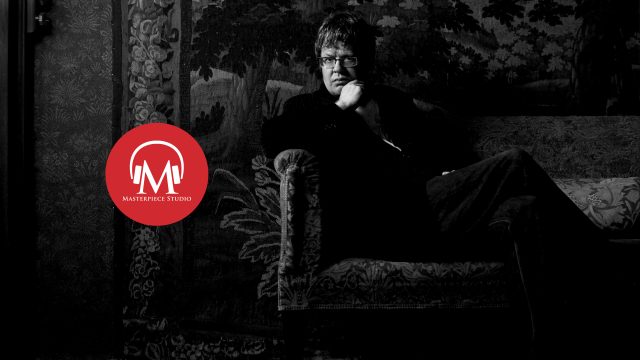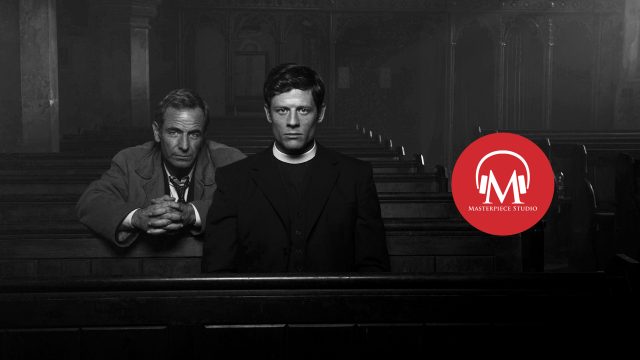Jace Lacob (Jace): MASTERPIECE Studio is brought to you by Audible. For a free trial, go to Audible.com/Masterpiece.
Jace: I’m Jace Lacob and you’re listening to MASTERPIECE Studio.
Back in Season One, Grantchester’s very first episode opened on Amanda and Sidney’s flirtatious outing.
CLIP:
Amanda: Do something for me.
Sidney: What?
Amanda: Throw away those shoes.
Conductor: The train’s about to depart!
Sidney: I’ll just pop down to Savile Row, shall I, and have some new ones handmade?
Amanda: See you next Friday.
Jace: But despite their obvious attraction, 1950s social conventions kept the two apart. Sidney never proposed, and Amanda married Guy.
CLIP:
Amanda: Why wasn’t it you? Why didn’t ask me to marry you?
Sidney: I thought you could do better.
Jace: Now, they’re both trying to move on. Sidney’s dating other women, but is still pining for Amanda.
CLIP:
Margaret: …And I’m not appropriate? Well I bet I know who is. Your little friend Amanda.
Sidney: This has nothing to do with her.
Margaret: I’m no fool!
Jace: And Amanda’s newly pregnant, but is more unhappy than ever.
CLIP:
Morven Christie: She’s someone else now. She’s living a life that she used to mock. I find her story really heartbreaking and I still do.
Jace: Is Amanda doomed to live out her days as just another 1950s housewife? Or is there any hope for our star-crossed lovers? This week, we’ll turn to the actor who plays Amanda Hopkins — Morven Christie — for some answers.
Jace: Welcome.
Morven Christie (Morven): Hello. Thank you very much.
Jace: We’re introduced to Amanda when she falls into the river, after playing on a swing with Sidney -in the first episode.
Morven: Yeah.
Jace: What did you make of the character when you read the scripts for the first season?
Morven: Oh, I loved her. I was really taken with her vivacity and her, kind of, her passion for life. She was such a, kind of, alive person. And I think Series 1, kind of, late 20’s, unmarried, has a job restoring art…All of those things are, kind of, quite rare for a woman of her status in the 50’s.
And I just really like the idea of exploring what it would be like for someone who has these really powerful elements to her personality; this need to, kind of, have fun. I find her story really heartbreaking and I still do.
Jace: In Season 1 there was ah, a, sort of, distinct aura of Audrey Hepburn -to Amanda Hopkins, nay Kendall.
Morven: Yes.
Jace: Was Hepburn an influence on how you choose to play the role, at all?
Morven: Yes. Absolutely. She was who I pictured when I read the first script. It’s just something about that freedom that Hepburn had, particularly in Roman Holiday. This, kind of … This girl that would run around in bare feet and just, sort of, buck convention in that way, and do it quite innocently. And so, that was definitely, for me, a really clear influence.
And when I got together with the costume and makeup departments, that was also the image that they had in mind. So it all, kind of, came together really organically, and I think, for me, that came out of being a massive fan of her work.
Jace: Now in the second season, Amanda is married and living in London. What keeps her heading back to the village of Grantchester on a regular basis?
Morven: When Amanda married Guy, there was all this promise of she would be able to continue working at the gallery, and a, sort of, expectation that she would continue to live quite a vibrant life, and in reality that’s not what’s happened.
She’s incredibly lonely and isolated. She’s at home in the house by herself, all day long, while he’s out on business trips and working. And so … yeah, I think going back to Grantchester and being able to be around Sidney and in that environment, I think, just makes her feel like her old self.
Jace: I love the friendship between Amanda and Sidney.
Morven: Yeah.
Jace: One that is rooted in their deep feelings for one another. What do you make of their rapport, particularly at a time when men and women weren’t permitted to just be friends?
Morven: Yeah, it’s fascinating, isn’t it? I think, one of the things that really appealed to me about that relationship, way back before we began Series 1, was that it felt like both of them were most themselves when they were with each other.
CLIP:
Amanda: Next week, we’ll go to the theatre. Oh! Toffee apples. We’ll have toffee apples.
Sidney: Toffee apples?
Amanda: Mm.
Sidney: How your mind works!
Morven: They share a sense of humor, and a sense of playfulness, and just seem to be able to accept each other exactly where they are.
Jace: Now, Guy Hopkins would seem to be the polar opposite of Sidney Chambers.
He’s, sort of, cold, aloof, he’s uncaring, and married life has not turned out, at all, how Amanda expected. Do you think that she regrets marrying Guy, or was that the only option available to her at the time?
Morven: I think, at the time, it was absolutely the only option available to her.
I think, had Sidney ever actually tried to have a relationship with Amanda in that way she certainly would have gone for it. But I think that, within the conventions of that society, the idea of her marrying a parish vicar would be unheard of.
That’s not to say Amanda wouldn’t have done it. I think that she would have, but everybody involved would have needed to be completely committed to that thing. And Sidney was going through his own journey and not ready to do that, I think, until it was too late.
So, I think Amanda probably regretted the fact that she was marrying Guy, before the wedding even took place. I think she felt very trapped and just a great sense of obligation towards her family.
Jace: I think she does become the embodiment of dissatisfaction seen in so many women in the 1950’s–
Morven: Absolutely.
Jace: –who were trapped by convention and circumstance.
Morven: Yeah.
Jace: Is that the realization that Amanda has had about life, and her life?
Morven: I think that she is now — at the point that we find her in Season 2 — she is now living a life that she doesn’t recognize and feels utterly trapped in it.
Because I think that’s another truth about that period that women didn’t have choices in the way that we have choices now. If something isn’t working out, you can’t walk away from in it in the same way that a modern woman could.
But … yeah. I think, certainly, since the wedding’s taken place, every fear that she had has been realized, and she is, in fact, living exactly the life that she had always wanted to avoid.
Jace: Turning our attention to episode 4…In this week’s episode, we see just how bad things are for Amanda and Guy at Jennifer’s party; he’s actually, physically, rough with her.
Morven: Yeah.
Jace: How dire are things between the couple, at this point?
Morven: I think things between them are fairly bad. I think as soon as the marriage took place, Guy went to back to living his life, going off on business trips, there’s implications that he’s having affairs elsewhere, and she is at home by herself, unable to rely on any of the things that she used to have in her life just to make her feel like herself.
And within in that, she seems to have lost the ability to speak up for herself too. So, as he’s become sterner, she’s become quieter. Guy, just treats her like a belonging now. There’s just expectations on her and she’s just a, kind of, extension of him. She’s lost her own identity.
CLIP:
Amanda: So Jen, how is it?
Jen: Really long hours, I’ve got to get through this huge pile of books to get through, the phone rings every five minutes… It’s heaven really.
Margaret: How many weeks holiday do you get?
Jen: Two.
Margaret: Me too. Don’t know what to do with it when it comes. How are the men?
Jen: Alright so far. Mostly married…
Jace: One of the things that I loved about this week’s episode is that she does seem so, as you said, isolated, so out of place at the party. She becomes caught in a conversation between Jennifer and Margaret about work–
Morven: Yeah.
Jace: –and it becomes very apparent that she has no contribution. What is the loss of her career mean for Amanda and can she find meaning again now that she’s realized that she’s, sort of, stuck with Guy?
Morven: I think, for Amanda, her career was huge. I think she loves art, and I think, it’s very difficult for anyone — regardless of the time period — I think it’s very difficult for anyone who’s lost the thing that makes them feel like they contribute to the world.
And Amanda, by this point, doesn’t feel like she’s contributing anything to the world. The loss of her career is massive for her, but I think that the ramifications are that she no longer knows how to communicate with the people that she used to communicate with because she doesn’t know who she is anymore. She’s someone else now. She’s living a life that she used to mock.
CLIP:
Amanda: I’ve taken to drinking martinis. I’m like Dorothy Parker, only without the wit. Or the hair.
Sidney: It’s not even 11.
Amanda: ‘Never mix, never worry.’ I learned that from you.
Morven: I don’t think she sees any way of being able to live where she is and how she is. So, she’s just, kind of, drinking martinis at 11 in the morning and trying to get through the day.
Jace: Now she says of marriage in this episode quote, “Someone who’s always there for you, knows your thoughts before you know them yourself, laughs at your jokes, listens to your stupidities, lightens your sorrows.”
Morven: Hmm.
Jace: But that’s her relationship with Sidney, no?
Morven: Yes. Correct. Yeah. I think that you’re never more aware of what a perfect relationship is until you’re in one that’s completely the opposite. So, she has none of that with Guy. He’s not interested in her, or even in sharing his life with her. Even in telling her about his day. There’s just an absolute silence.
Yeah. She’s absolutely talking about Sidney.
Jace: She says that she can see Margaret as a vicar’s wife. What do you think Amanda actually makes of her competition?
Morven: I think she’s very aware that Margaret is a brilliant match for Sidney and I think that terrifies her. I think Margaret is exactly the kind of woman that Amanda would be friends with, and I think, you know … With Hildegard, it was different. They were so different, that there was … it was, kind of, easier for Amanda, in a sense, because it was like, “Okay. So he’s suited to this kind of woman, this quiet woman, this, you know, someone who’s not as much of a handful maybe as I am.”
Whereas when Margaret comes along, it’s almost like she can see exactly why her and Sidney are the perfect couple because Margaret’s this awesome, funny, brave, independent, smart, sassy woman. And, she’s now this, kind of, numb, sort of, lost person. I think she absolutely thinks that Margaret and Sidney make an amazing couple. I think it’s terrifying for her.
Jace: I mean, she’s a ghost now, essentially.
Morven: Absolutely. She’s a ghost. Yep.
Jace: When Sidney confronts her about the shoplifting incident–
Morven: Hmm.
Jace: –Amanda tries to play it off as a quote “silly mistake.”
Jace: But is Amanda shoplifting a deeper cry for help, or something else all together?
Morven: I think she wants to feel things. I think she wants to feel a rush of being alive, and the shoplifting … I mean, you know, she ends up in the police station with Geordie, and it’s kind of a cry for help, I guess. But that’s the part that she’s unaware of. I think what she’s aware of is wanting to feel something, other than dead, other than numb, other than wasted. I think she just wants to feel the sensation of being alive even if it’s doing something she shouldn’t be doing.
Jace: In the past, Amanda’s been presented as being a sort of, perfect debutante. She’s almost idealized. Were you surprised by the shoplifting scene this season?
Morven: I loved it. I loved it. I think it just said so much about what had been taken from her. That she was almost trying to steal back an identity, like steal back a place in the world. Because she had one before. She existed. She was quite a distinct character and happy.
Jace: Now, in this episode as well, Amanda confesses to Sidney that she’s pregnant with Guy’s child and says it’s quote “too late for the two of them.”
Morven: Hmm.
Jace: Is she being honest here or is more that she’s trapped by all of these circumstances and that there is no possible future for Amanda and Sidney now?
Morven: She is pregnant, and it’s 1953, and … you know, I think even in 2016, if you’re pregnant with your husband’s child it’s … you’re not, sort of, in a position to jump off with this old love that finally comes back and says, “Well, let’s be together.”
I think she is utterly bereft at her situation. So when she says, “It’s too late,” it’s too late for everything. It’s too late for her, it’s too late for him, it’s too late for them, it’s too late to live. It’s too late for everything.
Jace: It’s sad.
Morven: Hmm.
Jace: In an interview last year, you said quote “I think it’s kind of heartbreaking that women have never seen a reflection of themselves in film or on television.”
Morven: Hmm.
Jace: Where does Amanda Hopkins fit into that statement and is she a cautionary tale in some way?
Morven: I think when I said that, I was referring to general, sort of, television and film writing and it being male characters, generally, being able to reflect all sorts of physical types of man, all kinds of ages of man, all kinds of careers of man. So any man could watch some television show or some film, and find something that is a representation of themselves. And with women, I think the story is quite different. I think that there’s still limitations on the way that women are presented in drama.
I think, for me, with Amanda, she’s still, essentially, a young woman, but for me, I always want to be, through my work, kind of, telling the story of somebody who doesn’t necessarily feel like they can tell their own. And I certainly felt that with Amanda. I know women now, in 2016, who feel like they’re trapped, and in situations or in marriages, and trying to please other people and not being able to make decisions that most satisfy themselves. And so… yeah.
Within the constraints of the 50s, within the constraints of that period, and that society, I think it’s a really valuable thing to explore.
Jace: Last night I watched BBC2’s Murder, which you were fantastic in.
Morven: Thank you.
Jace: You played Det Corinne Evans, a role that was initially written for a man.
Morven: That’s right, yeah.
Jace: Why is the entertainment industry still stuck in the distant past when it comes to writing female characters?
Morven: I think it’s really simple. I think it’s just that most of the writers in television are still men. So there’s always just gonna be a problem with perspective because a woman is going to write a woman’s perspective, much more holistically than a man would because a man is always going to be writing it, slightly, from the outside.
I mean, what was interesting about that character in Murder is that Robert Jones wrote it as a man and when Kath Mattock, the producer, suggested that they switch the gender she specifically said to him, “Change nothing. Change nothing but her first name.” And that’s a really fascinating thing because, actually, there was nothing about the character that jarred.
There’s just an assumption that a woman is a certain … has certain characteristics that men don’t have. I don’t think that’s necessarily true.
You know, Sally Wainwright’s doing amazing work at the moment. She writes incredible female characters because, as a woman, she can allow them to be nasty, and tough, and to say the wrong things, and to make mistakes. They don’t have to, kind of, be pleasing or be feminine or be … Because a woman, just like a man, can be all of these things, all wrapped up into one person.
So I think there’s definitely improvement. There’s movement being made, but I think ultimately, the problem is just, at the moment, we still have … the majority of writers are male.
Jace: Now the Britain we see in Grantchester is very different from the world we live in today.
Morven: Mm-hmm.
Jace: Is Grantchester, the show, as much about the mysteries, as it is about the shifts in society that were underway at the time?
Morven: Yeah. That’s a great question. I think for me what’s interesting about the show is the latter, is the society, is the environment. Because each one of these mysteries that comes along seems to bring with it an issue that we, in 2016, look at very, very differently than they did in the 50s.
That’s definitely one of the things with the scripts that I continue to find fascinating, is, “Wow. Look how far we’ve moved on, but look how far we haven’t shifted on this issue, or this issue, or this issue.” So, yeah.
I mean, I’m always very aware that I’m playing a woman in 1953 for an audience in 2016. So, I’m looking at, as we all are, at their situation with modern eyes. And, that’s one of the things I love the most about Amanda is examining, “What would it be like if I, right now, ended up in that kind of situation. How would I feel?” So, yeah. That continues to be a really big part of playing that character for me. And feeling like I can, I don’t know, make some sort of political comment of my own through telling her story.
Jace: Now, Daisy Coulam, of course, wrote all of the scripts in the first season of Grantchester.
Morven: She did.
Jace: How important was her perspective in terms of developing Amanda?
Morven: Massive. Daisy is a wonderful human being. She, sort of…For anyone who’s read the books, you’ll know that the characters, sort of, they do move off quite quickly from what James Runcie originally wrote. And Amanda, obviously in the first book, the story with Guy is one chapter, and then she ditches the guy. She’s like, “See ya.”
But, obviously, dramatically in the story, this was something really fascinating for Daisy to explore. She a major force in what Amanda is, and in what they choose to tell with her is … that’s all Daisy.
Jace: One of the things that makes Sidney and Amanda’s friendship so believable is the chemistry onscreen between you and James Norton. What is it like working with James?
Morven: It’s fun. It’s great. He’s great.
He is, obviously, on set all the time, so it’s an exhausting shoot for him. Whereas with me I’m kind of in and out. I just get to come in and do these, sort of, humdinger scenes, and then, “Bye, James. See ya.”
While, he, you know, gets thrown in the river by Robson Green. I love working with him. And I think the scenes between Sidney and Amanda, for me, are always the ones that … where the writing just …. it is so beautiful, and so soulful. And so it’s great.
Jace: Now, a lot of American’s might not realize that Grantchester is filmed in the actual village of Grantchester, which is not a fictional place, but an actual real, live village.
Morven: It’s a real live village. Yeah.
Jace: It’s a real live village. What is it like filming in the actual Grantchester?
Morven: It’s wonderful. We actually shoot quite a lot of the interiors in London — in and around London — and then we go and do all the exteriors, and all of the church scenes, and all of that, in and around Grantchester, and in central Cambridge. And it’s just … It’s like a, sort of, wonderful school trip. It’s when we get to, kind of, make the story really come to life. Because there’s work that we, that our crew, do in the village to make it more like the 1950s. Certain things have to be changed. Street lights, and you know, double-glazing windows have to be covered up with, you know, plants, or whatever, but the village itself is, kind of, like going back into this beautiful, sort of, pocket of time that doesn’t really exist anymore. It’s idyllic and it’s pretty. So it’s lovely. Every time we go back it’s really special.
Jace: And what do you enjoy the most about playing Amanda?
Morven: I think the thing I enjoy the most is the oppositions. So Amanda will often, particularly in Series 2, try to appear like she’s ever so happy, and everything’s wonderful on the outside, but what’s going on on the inside is heartbreak. And I really enjoy that. And … Yeah. I love that story.
It’s like Betty Draper. I used to really love watching Betty Draper in Mad Men because I loved the idea of who the woman was underneath all these constraints, and I have a similar thing with Amanda. It’s like you find all the center of who she is and then you, kind of, stick a straight jacket on it, and it’s what manages to seep out and what doesn’t. That’s the fascinating thing, for me, as an actor.
Jace: See, I knew I liked you. You like Betty Draper.
Morven: I love Betty Draper.
Jace: Yes.
Morven: She was my … Audrey Hepburn was my Season 1 reference and Betty Draper was my Season 2.
Jace: That makes so much sense though.
Morven: Yeah.
Jace: Now, peel back the curtain a little bit. Are there any humorous, behind-the-scene stories from making the last 2 seasons?
Morven: Oh, God. So many, but on the spot to remember one? Gosh, that’s really tricky. (Laughter). I think that James and Robson, when on set together, lots of, kind of, japes occur when they are around. But really, because most of the scenes that I do are quite serious, it all gets quite serious when I’m on set.
They’re terrible together, those two. They sort of, bring out the best and the worst in each other. It’s quite fun.
Jace: And then, finally, final question. Only two episodes left this season. If you could sum up where things are going in three words…
Morven: Oh, I’m not allowed. I don’t know if there’s anything I can … Well, three words. That’s really difficult, Jace, that’s really difficult! I don’t know if I can do that.
Jace: I mean, “I’m not allowed” is three words. So …
Morven: I’m not allowed. Those are my three words. I’m not allowed.
Jace: Morven Christie, thank you so much.
Morven: Thank you so much.
Jace: Only two episodes of Season 2 of Grantchester remain.
Catch the show on MASTERPIECE, Sundays at 9 pm ET, and listen to MASTERPIECE Studio the morning after to go behind the scenes of all the dramatic developments.
CLIP:
James Norton: Because we’ve been building up to this point for so long, and because it means so much to the characters, it exhausting, it’s emotional, it’s not particularly pleasant, but at the same time you can’t deny that it’s exciting.
Jace: MASTERPIECE Studio is hosted by me, Jace Lacob. Kathy Tu is our editor. Rachel Aronoff is our production coordinator. Special thanks to Nathan Tobey and Barrett Brountas. The executive producer of MASTERPIECE is Rebecca Eaton.
You can find this podcast at pbs.org/masterpiece, on Stitcher, and on iTunes.
MASTERPIECE Studio is brought to you by Audible.
Sponsors for MASTERPIECE on PBS are Viking River Cruises, Audible, and The MASTERPIECE Trust.








